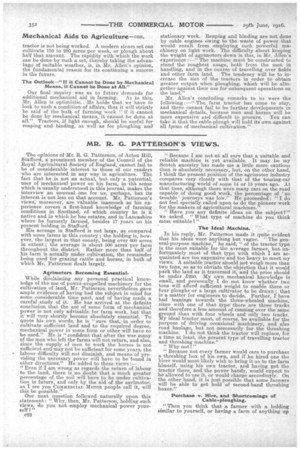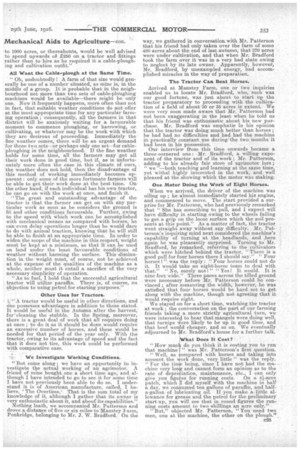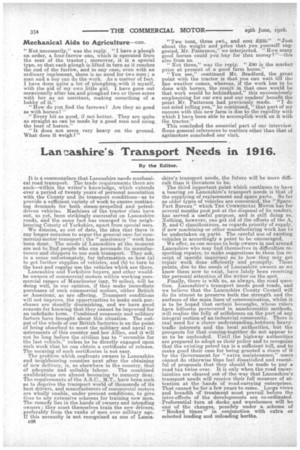MR. R. G. PATTERSON'S VIEWS.
Page 4

Page 5

Page 6

If you've noticed an error in this article please click here to report it so we can fix it.
The opinions of Mr. R. G. Patterson, of Acton Hill, Stafford, a prominent member of the Council of the Royal Agricultural Society of England, cannot fail to be of considerable interest to those of our readers who are interested in any way in agricultare. The fact that he is not an actual, but only a potential, user of mechanical power on his farm, in th■N sense which is usually understood in this journal, makes the interview an unusual one for us, perhaps, but its interest is not less on that account. Mr. Patterson's views; moreover, are valuable inasmuch as his experience covers a first-hand knowledge of farming conditions in Scotland, of which country he is a native and in which he has estates, and in Lancashire where he formerly farmed, besides 17 years on his present holding in Stafford.
i His acreage n Stafford is not large, as compared with some farms in this country ; the holding is, however, the largest in that county, being over 600 acres in extent; the average is about 300 acres per farm throughout the district. Rather more than half of his farm is actually under cultivation, the remainder being used for grazing cattle and horses, in both of which Mr. Patterson deals largely.
Agrimotors Becoming Essential: While disclaiming any personal practical knowledge of the use of power-propelled machinery for the cultivation of land, Mr. Patterson nevertheless gave ample evidence of having had the subject in mind for some considerable time past, and of having made a careful study of -it. He has arrived at the definite conclusion, that the use of some form of mechanical power is not only advisable for farm. work, but' that it will very shortly become absolutely essential. TO quote his own words, he is "sure that, in order to cultivate sufficient land and to the required degree, mechanical power in some form or other will have to be used." He is "confident that after the war many of the men who left the farms will not return, and also, since the supply of men to work the horses is not sufficient and may not be sufficient for some years, the • labour difficulty will not diminish, and means of providing the necessary power will have to be found in other directions." He added to these views:— "Even if I am wrong as regards the return of labour to the land, there is no doubt that a much greater percentage of the soil will have to be under cultivation in future, and only by the aid of the agrimotor, as I see you COMMERCIAL MOTOR people call it, will this be possible." Our next question followed naturally upon this statement: "Why, then, Mr. Patterson, holding such views, do you not employ mechanical power yourself 1 " c22
"Because I am not at all sure that a suitable and reliable machine is yet available. It may be my Scotch ancestry has made me a little more cautious than is absolutely necessary, but, on the other hand, I think the present po-sition of the agrimotor industry compares very closely with that of the touring-car manufacturing world of some 14 or 15 years ago. At that time, although there were many cars on the road capable of doing good work, the percentage of no trouble' journeys was low." He proceeded : "I do not feel specially called upon to do the pioneer work for the makers of agricultural machines.
"Have you any definite ideas on the subject?" we asked. "What type of machine do you think most suitable I" In his reply, Mr. Patterson made it quite evident that his ideas were anything but vague. "The general-purpose machine,' he said, "of the tractor type is the most suitable for the average farmer, but unfortunately most of that type with which I am acquainted are too expensive and too heavy to meet my views. A suitable tractor should not weigh more than two tons, so as to obviate the objection that it would pack the land as it traversed it, and the price should be under £250. My own mechanical knowledge is small, and personally I do not know whether two tons will afford sufficient weight to enable three or four ploughs or a large cultivator to be drawn ; that is a, matter for engineers to decide. Further, I have had leanings towards the three-wheeled machine, since with one of that type there are three tracks and therefore a less amount of running over the same ground than with four wheels and only two tracks. My ideal tractor must, of course, be available for the purpose of driving occasional machinery, and also road haulage, but not necessarily for the threshing machine. I do not think the tractor will replace, for a time at least, the present type of travelling tractor and threshing machine." " Why not ? "
"Because not every farmer would care to purchase a threshing box of his own, and if he hired one the hirer would most likely wish to bring it on to the farm himself, using his own tractor, and having got the tractor there, and the power handy, would expect to be allowed to use it, or would charge accordintly. On the other hand, it is just possible that some farmers will be able to get hold of second-hand threshing boxes."
Purchase v. Hire, and Shortcomings of Cable-ploughing.
"Them you think that a farmer with a holding similar to yourself, or having a farm of anything up to 1000 acres, or thereabouts, would be well advised to spend upwards of £250 on a tractor and fittings rather than to hire as he required it a cable-ploughing and cultivation outfit."
All Want the Cable-plough at the Same Time.
" Oh, undoubtedly! A farm of that size would generally be one of a number situated, as mine is, in the
middle of a group. It is probable that in the neighbourhood not more than two sets of cable-ploughing machines would be available—there might be only one. Now it frequently happens, more often than not in fact, that suitable weather conditions do not offer at the most appropriate time for any particular farming operation ; consequently, all the farmers in that district -will be anxiously waiting for a favourable moment to commence ploughing, or harrowing, or, cultivating, or whatever may be the work with which they are desirous of proceeding. Immediately the • fine weather comes, there will be an urgent demand for those two sets—or perhaps only one set—for cableploughing in the neighbourhood. If the fine weather holds for some time, all the farmers may get all their work done in good time, .but if, as is unfortunately more often the case in this climate of ours, the weather does not. hold, then the disadvantage of this method of working immediately becomes apparent: only some of the more fortunate farmers will be able to get their work done at the best time. On' the other hand, if each individual has his own tractor, he can go on with the work at once, and finish 'it.
" The great and outstanding advantage of the tractor is that the farmer can get on with any particular work as soon as he considers the ground is fit and other conditions favourable. Further, owing to the speed with which work can be accomplished with mechanical means as compared with horses, he can even delay operations longer than he would dare to do with animal traction, knowing that he will still be able to finish at an appropriate time. In order to widen the scope of the machine in this respect, weight must be kept at a minimum, so that it can be used on land under the least favourable conditions of weather without harming the surface. This diminution in the weight must, of course, not be achieved at the expense of the qualities of the machine as a whole, neither must it entail a sacrifice of the very necessary simplicity of operation.
" As to fuel, I hold that the successful agricultural tractor will utilize paraffin. There is, of course, no objection to 'using petrol for starting purposes."
Other Uses !or Tractors.
ij "A tractor would be useful in other directions, and one possesses advantages in addition to these stated. It would be useful in the Autumn after the harvest, for'eleaning the stubble. In the Spring, moreover, there is a great deal M work that all requires doing at once ; to do it as it should be done would require an excessive number of horses, and these would be needed for that period of the year only. With the tractor, owing to its advantage of speed and the fact that it does not tire, this work could be performed with comparative ease.
--;r: We Investigate Working Conditions.
"But come along ; we have an opportunity to investigate the actual working of an agnmotor. A friend of mine bought.one a short time ago, and although I have intended to go to see it for some time I have not previously been able to do so. T understand it is of American manufacture, called, I believe, The Overtime.' That is the sum total of my knowledge of it, although I gather that its owner is very enthusiastic about it, and abouf its capabilities."
Nothing loath, we accompanied" Mr. Patterson and drove a distance of five or six miles to Manstey Farm Penkridge, belonging to Mr. J. W. Bradford. On the way, we gathered in conversation with Mr. Patterson that his friend had only taken over the farm of some 480 acres about the end of last autumn, that 370 acres • were under cultivation, and that when Mr. Bradford • took the farm over it was in a very bad state owing to neglect by its late owner. Apparently, however, Mr. Bradford, by unexampled energy, had accomplished miracles in the way of preparation.
The Tractor Can Beat Horses.
Arrived at Manstey Farm, one or two inquiries enabled us to locate Mr. Bradford, who, such was our good fortune, was just about to start up the tractor preparatory to proceeding with the cultivation of a field of about 30 or 35 acres in extent. We were very soon made aware that Mr. Patterson had not been exaggerating in the least when he told us that his friend was enthusiastic about his new purchase. Mr. Bradford was emphatic in his opinion that the tractor was doing much better than horses ; he had had no difficulties and had had the machine in practically constant use during•the two months it had been in his possession.
Our interview fforn this time onwards became a three-cornered one : Mr. Bradford, a willing exponent of the tractor and of its work ; Mr. Patterson., adding to his already fair store of agrimotor lore ; " we "—both teaching and learning at the same time, yet withal highly interested in the work, and well pleased at the shoiving which the motor was Making.
One Motor Doing the Work of Eight Horses.
When we arrived, the driver of the machine was oiling up ; he almost immediately started his engine, and commenced to move. The start provided a surprise for Mr. Patterson, who had previously remarked that "She has something to pull, and I expect will have difficulty in starting owing to the wheels failing to get a grip on the loose surface which the soil presents at this point." As a matter of fact, the tractor went straight away without any difficulty. Mr. Patterson's.inquiring mind next considered the machine's capability of turning at the headlands, and here again he was pleasantly surprised. Turning to Mr. Bradford, he remarked, referring to the cultivators which were hitched behind the tractor, "There, is a good pull for four horses there I Should say." " Four horses I' was the reply : Four horses could not do it. It would take an eight-horse team to deal with that." " No, surely not! " " Yes! It would. It is nine feet wide." Three paces across the tilled ground were necessary before Mr. Patterson could be convinced; after measuring the -width, however, he was satisneel that four horses would be hard set to get along with the machine, though not agreeing that it would require eight.
We stayed on for a short time, watching the tractor at work ; the conversation on the part of our farming friends taking a more strictly agricultural turn, we were interested to hear that mangels were doing well, that turnips ere likely to be up in good time, and that beef wo d cheaper, and so on. We eventually adjourned to r. Bradford's house for a further talk.
hat Does It Cost?
"How mile do you think it is costing you to run. that machine " was Mr. Patterson's first question.
" Well, as ompared with horses and taking into account the' 'ork done, very little was the reply.
"Fos' the ti being, since I have not had the machine very lon and cannot form an opinion as to the rate of depre iation, maintenance, etc., I can only
give you figu es for running costs. On a 41-acre patch, which did myself with the machine in half a day, we con umed ten gallons of paraffin, and halfa-gallon of lu ricating oil. If you Make a little allowance for grease and the petrol for the preliminary start-up, you will see that in round figures the running costs amount to two shillings an acre only." "But," objected Mr. Patterson, "You need two men, one at the machine, the other on the plough." "Not necessarily," was the reply. "I have a plough on order, a four-furrow one, which is operated from the seat of the tractor ; moreover, it is a special type, so that each plough is lifted in turn as it reaches the end of the furrow, and in any case, even with an ordinary implement, there is no need for two men ; a man and a boy can do the work. As a matter of fact. I have done quite a lot of ploughing„with it myself, with the aid of my own little girl. I have gone out occasionally after tea and ploughed two or three acres with her as an assistant, making something of a hobby of it."
"How do you find the furrows? Are they as good as with horses? "
"Every bit as good, if not better. They are quite as straight as can be made by a good man and using the best of horses."
"It does not seem very heavy on the ground. What does it weigh?"
" Two tons, three cwt., and cost 2230.1' "Just about the weight and price that you yourself suggested, Mr. Patterson," we interjected. "flow many good horses could you buy for that money ? "—this also from us.
" Not three," was the reply. " 280 is the market price at present of a good farm horse." "You see," continued Mr. Bradford, the great point with the tractor is that you can wait till the fine weather comes, whereas, if the work has to be done with horses, the result in that case ,would be that work would be behindhand," this unconsciously emphasising for our own and our readers' benefit the point Mr. Patterson had, previously made. "I do not mind telling you," he continued, that part of my success with this new farm is due to the rapidity with which I hava been able to accomplish work on it with the tractor."
This concluded the essential part of our interview. Some general references to matters other than that of agrimotors concluded our visit.






























